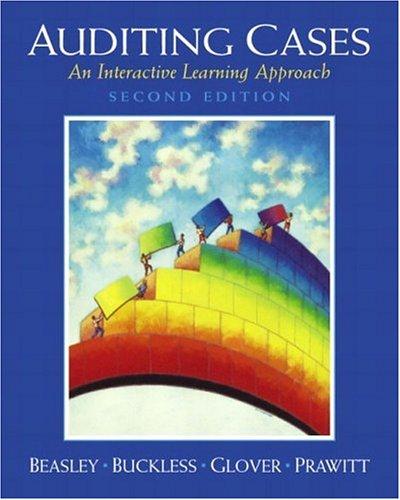Question
1. Probable Cause is a higher standard to meet than Beyond a Reasonable Doubt . True False 2. A police officers has the
1. Probable Cause" is a higher standard to meet than "Beyond a Reasonable Doubt".
True
False
2. A police officers has the right during a Terry Stop to search an area other than just the stopped individuals body/person, but also areas and places that may conceal items dangerous to the police.
True
False
3. A regular/basic Warrant issued by a judge will specify the time framesin which the warrant must be executed. This means it must be executed within a certainnumber of days andatcertain times of day.
True
False
4. A requirement that an individual identify themself during an investigative detention is a violation of the Fifth Amendment right to remain silent.
True
False
5. A search by private individuals that uncover evidence is not subject to the exclusionary rule.
True
False
6. A suspect abducts a person, kills them and dumps the body in an open field. Before the body is found police beat the location out of a suspect. Since they beat the location of the body out of the suspect it will be excluded as per the exclusionary rule.
Which scenario will be an exception to the exclusionary ruleto this scenario?
| A | The policewait a few hours after dicsovering the body, read suspect Miranda warnings to which suspect repeats location of body. | |
| B | After the abduction a search was being conducted by volunteers and National Guardsman. Part of the search area was going to be the field where the body was left. | |
| C | No exception is necessary since the police were acting in Good Faith. | |
| D | No exception is necessary since the body is not the fruit of the poisonous tree. |
7. At a suppression hearing a judge must rule on whether a police officer had "probable cause" to arrest an individual.
The officer states everything that he saw and did. The judge must review whether a "reasonable person" in that situation would have come to the same conclusion in order to determine if there was probable cause.
True
False
8. During a Stop and Frisk police officers are allowed to conduct full blown searches of the stopped individual for the safety of the police officers.
True
False
9. Garbage left on the curb for trash removal is not afforded right of privacy protections for what reasons
10. If the police ask a private indivdual to search their roomates room for evidence the exlcusionary rule will not apply since the search is conducted by a private individual.
True
False
11. In making a determination whether law enforcment had Reasonable Suspicion to detain an individual can? the Court consider the fact that the individual refused to answer questions [other than their identity]?
True
False
12. Law enforcement needs "probable cause" in order to justify two different acts. What are the two different acts?
13. New York State does not follow the "Good Faith" exception to the exclusionary rule.
True
False
14. The Exclusionary Rule was created by statute.
True
False
15. The US Supreme Court made the Exclusionary rule applicable to the states through what case?
| A | Weeks v US | |
| B | Wolf v Colorado | |
| C | Brown v Mississippi | |
| D | Mapp v Ohio | |
| E | Miranda v US | |
| F | None of the above |
16. What is the standard needed for a police officer to do an Investigative Detention?
17. A "Search Incident to Arrest" allows police officers to searchareas within the immediate control of the individual arrested.
True
False
18. Define Probable Cause to search.
19. The Right to Privacy is enforceable against the states because of the Due Process clause in the Fourteenth Amendment.
True
False
20. Write a brief on the case of Katz. The brief needs to be structured in the following way.
1 Title
2 Brief Statement of the who is appealing and why [Who convicted? What for? Sentence? etc]
3 Brief Statement of the Main facts of case [What was the crime? Who got arrested/ Why? etc]
4 Outline the Main Issue the Court was ruling on. There is one main ruling in this case which is of importance to our topic. In fact it changed a fundamental principal related to Expectation of Privacy. It is clearly there, so point it out.
5 Ruling [rationale] for the Courts ruling onthe Main Issue you bring up. Briefly discuss the Dissent.
6 Final conclusion by the Court
Step by Step Solution
There are 3 Steps involved in it
Step: 1

Get Instant Access to Expert-Tailored Solutions
See step-by-step solutions with expert insights and AI powered tools for academic success
Step: 2

Step: 3

Ace Your Homework with AI
Get the answers you need in no time with our AI-driven, step-by-step assistance
Get Started


